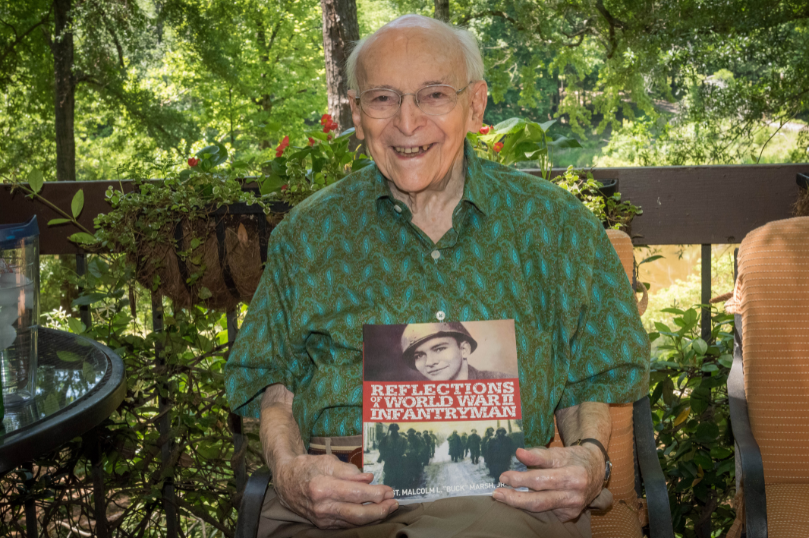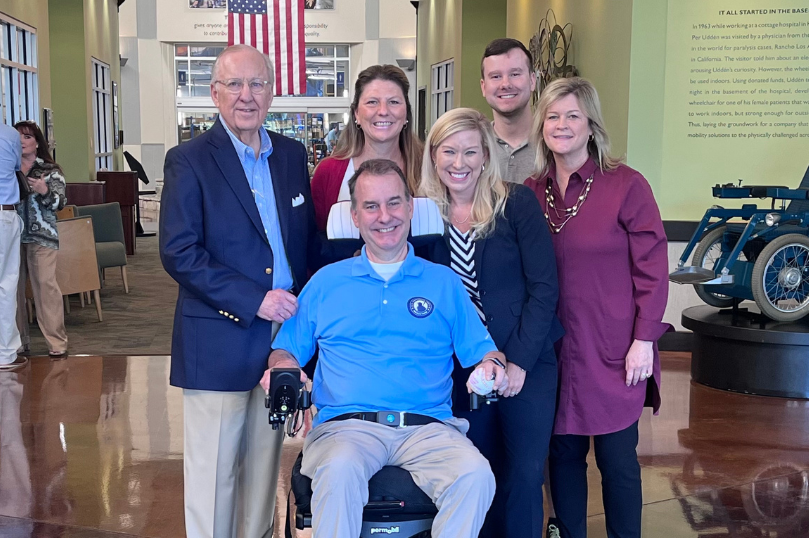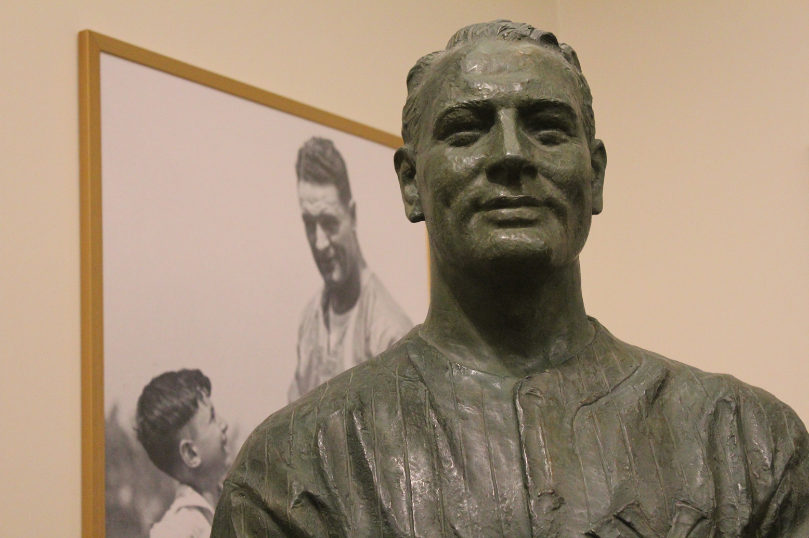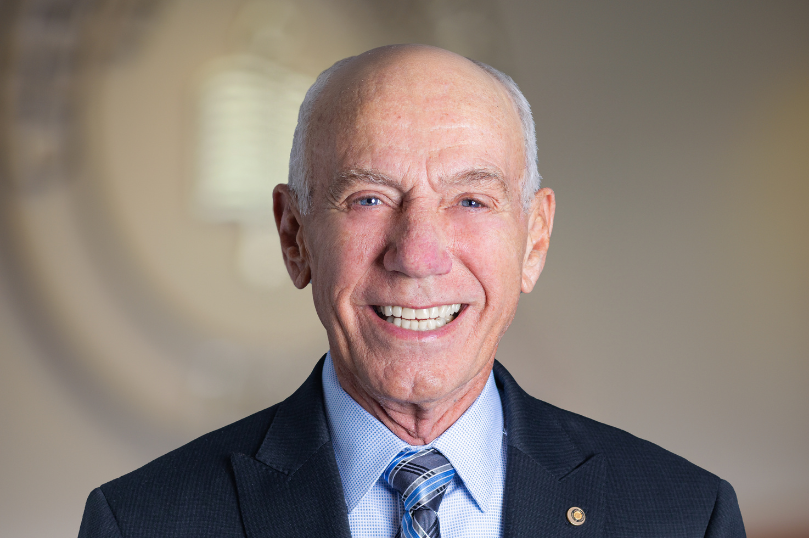By: Barbara Drake, University of Florida
Rectitude is not something that is naturally ordained. Instead, it is learned and cultivated over time in thousands of decisions that form a person’s character,” writes Bob Lloyd, Florida ’87. While Bob may have learned about the Cardinal Principles upon becoming a member of the Florida Alpha Chapter at the University of Florida, his parents and grandparents guided him from an early age.
Bob’s grandparents, J. Saxton and Adelaide ‘Lady’ Lloyd, were well-known business and civic leaders in Daytona Beach, Florida, throughout the 1930s and 1940s. Saxton opened Lloyd Buick Cadillac in 1934. He used his leverage to advocate for the widening of US 1 to four lanes and helped get the Daytona Speedway built in the 1950s. The speedway’s infield lake is named in Saxton’s honor, Lake Lloyd. In addition, he served on the board of trustees for the state’s first higher education institution for African Americans, Bethune-Cookman. It was this connection that would later influence his grandson, Bob.
Dr. Mary McLeod Bethune
The daughter of formerly enslaved parents, Mary Jane McLeod Bethune, was the first in her family to be born free. Born on July 10, 1875, in Mayesville, South Carolina, she was the fifteenth of seventeen children. Like the rest of her family, when she was little, she picked cotton until the opening of a missionary school enabled her to receive an education. She went to Chicago to attend the Moody Bible Institute to become a teacher.
In 1904 she moved to Daytona Beach, where a sizeable Black population had grown up around the construction of the Henry Flagler East Coast Railway project. She opened the Daytona Literary and Industrial Training Institute for Negro Girls with “$1.50, faith in God, and five little girls.” The school grew and, in 1923, merged with Cookman Institute in Jacksonville and became known as Bethune-Cookman College (a university since 2007).
Bethune became a national figure during her work to improve race relations and education for minorities. She founded the National Council of Negro Women in 1935 and served as vice president of the NAACP from 1940 to 1955.
She would go on to advise five presidents, in particular the FDR administration. Her roles would lead to her directly creating jobs for minorities and promoting anti-lynching. Her close friendship with Eleanor Roosevelt led to the enactment of the Women’s Army Corps in 1943.

Southern Politics
Saxton was passionate about improving Daytona Beach and Volusia County conditions for the Black residents. With a decades-long friendship with Bethune, he supported the school and founded the Bethune-Cookman board of counselors. He and his son Robert (Bob’s father) served as chairmen. Bob had grown up hearing stories from his grandparents about civil rights. One memorable story occurred in the 1940s, shortly after the end of World War II. Saxton and Lady were waiting to catch the train to Washington, DC, at the Daytona Beach train station. Saxton was headed to Congress to lobby for the removal of wartime restrictions on rubber and steel for the automobile industry.
On the platform, the Lloyds see their friend Dr. Bethune. They cross over to speak to her before boarding. Bob recalls his grandmother’s story. “They chatted and learned she was headed to DC herself. And then there was a very poignant moment when [his grandmother] went to the front of the train, and she went to the back.” Bob continues, “There they were on the Daytona Beach platform, hanging out together as locals, then on the train to DC—same destination, different parts of the train. My grandmother would say it was how things were then.”

Later, at UF, Bob would learn even more about his grandfather’s legacy. He recalls one day during his sophomore year.
“I remember being in Turlington Hall in Dr. Richard Scher’s class, which was called Southern Politics,” he says. “He was lecturing an auditorium crowd of 200 to 250 students, and he started to talk about race relations in Florida. He focused on Daytona Beach and said it had a very progressive record in civil rights, and he credited a car dealer in Daytona Beach for helping make that possible.
“I sat there stunned because I was like, ‘I know who that is.’”
After class, Lloyd asked Scher if the car dealer was J. Saxton Lloyd.
“He looked at me like, Oh, am I in trouble? And he said, ‘Yes, it is,’ to which I said, ‘Well, I’m his grandson,’” remembers Lloyd.
That exchange launched Lloyd’s tutelage under Scher and the late Dr. Jim Button, who encouraged Lloyd to “do his own homework” on his grandfather’s legacy, he says. That included interviewing Saxton Lloyd for the Samuel Proctor Oral History Program archives.
“My professors at UF helped me gain a long awareness of not only the past but of the responsibility to carry it into the future and to make sure we preserve that great legacy,” says Lloyd.

Legacy
Shortly after graduating high school in 1983, Bob was invited to lunch by three noteworthy alumni from Florida Alpha: J. Hyatt Brown, ’59, Edgar Dunn, ’62, and Henry ‘Hank’ Coleman Jr., ’61. The three alums spoke to him about the foreign concept of fraternity and an organization called Phi Delta Theta. Bob became a brother in the bond of Phi Delta Theta in January 1984 and welcomed Hyatt’s eldest son, Powell, as a brother in January 1986.
A political science major, Bob was very involved on UF’s campus. During his tenure at UF, the Florida Alpha Chapter won many awards, including the Gold Star (four times), Excellence in Community Service and GHQ Trophy (three times), Paul C. Beam Trophy, Silver Star, Sound Learning Award, William Allen White Excellence in Communications Award, and Outstanding Rush Brochure. In 1986, Bob was the chapter’s delegate to the General Convention and winner of an Educational Foundation Scholarship. After graduation, Bob served the chapter as the house corporation president from 1999 to 2008. In addition to his involvement with Phi Delta Theta, he was a member of Florida Blue Key (a student leadership honorary society), a Preview counselor, an Honor Court chancellor, and a campus diplomat. At the end of his senior year, he was inducted into UF’s Hall of Fame, which honors outstanding student leaders.
“Someone once told me, ‘You get out of it what you put into it,’ and that’s one of the best pieces of advice I received,” says Lloyd.
After graduating from law school in 1991, Bob began his career as an attorney in Daytona Beach. One of his first clients was the insurance company, Brown & Brown. Named for his Florida Alpha Brothers Hyatt and Powell Brown, Bob acted as outside counsel to the nation’s sixth-largest insurance brokerage. He joined their team in 1999.
In addition to working his way up the ladder at Brown and Brown, from assistant general counsel to now executive vice president and general counsel, Bob attended many civic events. He also held many leadership positions, including serving two terms as chairman of Bethune-Cookman’s board of counselors. Advocating for diversity and inclusion is a natural continuation of the multigenerational dedication to civil rights and service to his community that his grandparents started.
Which is why his biggest project to date is so rewarding. Since 2018, he has helped lead the Dr. Mary McLeod Bethune Statuary Project as the vice president and board treasurer. This nonprofit raised over $800,000 to create a marble statue of Dr. Bethune that is now housed in the National Statuary Hall at the US Capitol in Washington, DC. In addition, the fund allowed for the creation of a bronze statue installed at the local Riverfront Esplanade Bethune Pavilion in Daytona Beach, a feature-length documentary that premiered on October 11, 2022, a K–12 curriculum, and a local exhibit for residents to see the Bethune statue before it was transported to DC.
Bethune died on May 18, 1955. Over sixty-five years later, on July 13, 2022, her memory was honored during the National Statuary Hall State Collection Statue Dedication Ceremony. At the base of the pedestal is an inscription of one of Bethune’s most famous quotes, “Invest in the human soul. Who knows, it might be a diamond in the rough.”
The Library of Congress blog states, “These are the words visitors to the US Capitol will now see at the newly installed statue honoring Mary McLeod Bethune. Today’s unveiling symbolizes Bethune’s life’s work as an American educator, Civil Rights activist, and humanitarian and makes her the first Black American to have a state-commissioned statue reside in the National Statuary Hall of the United States Capitol.
Bethune’s figure brings with it another first and a last. Weighing more than 6,000 lbs., the 11-foot statue was sculpted out of the last piece of statuary marble from Michelangelo’s quarry in Italy. It was created by Nilda Comas, the first Hispanic sculptor to create a statue for the National Statuary Hall Collection.
The cap and gown represent Mary McLeod Bethune’s commitment to education, her signature walking cane (a gift from President Franklin D. Roosevelt) honors her close relationship and work with the president, and the black rose is a tribute to her students whom she lovingly referred to as her ‘black roses.’”

Bob says of his fraternity experience, “it has guided me faithfully throughout my life and decision-making. If not for Phi Delta Theta Fraternity, I might not have formed friendships with Hyatt and Powell Brown. Without my relationships with Hyatt and Powell Brown, I may not have ever had an opportunity to work for and with Brown & Brown, Inc. Without my career at Brown & Brown, Inc., I may never have been afforded the opportunity to live and raise a family in Daytona Beach and follow in the footsteps of my parents, grandparents, and great-grandparents. Without Phi Delta Theta, I would not have been able to present my son, Matthew, Florida ’25, with his brother pin and watch him become a brother in the bond. Through various degrees of separation, my friendships all meandered through the Florida Alpha Chapter of Phi Delta Theta. My decisions have always flowed through the Cardinal Principles of Friendship, Sound Learning, and Rectitude.”
Excerpt edited for length and clarity. To read the full story, visit https://bit.ly/3j6coAR





